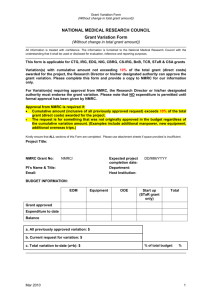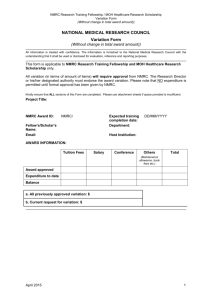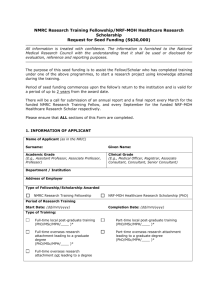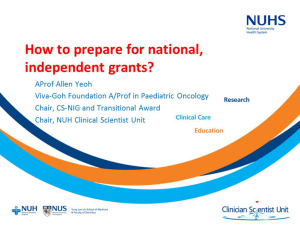Application Guideopens in a new window
advertisement
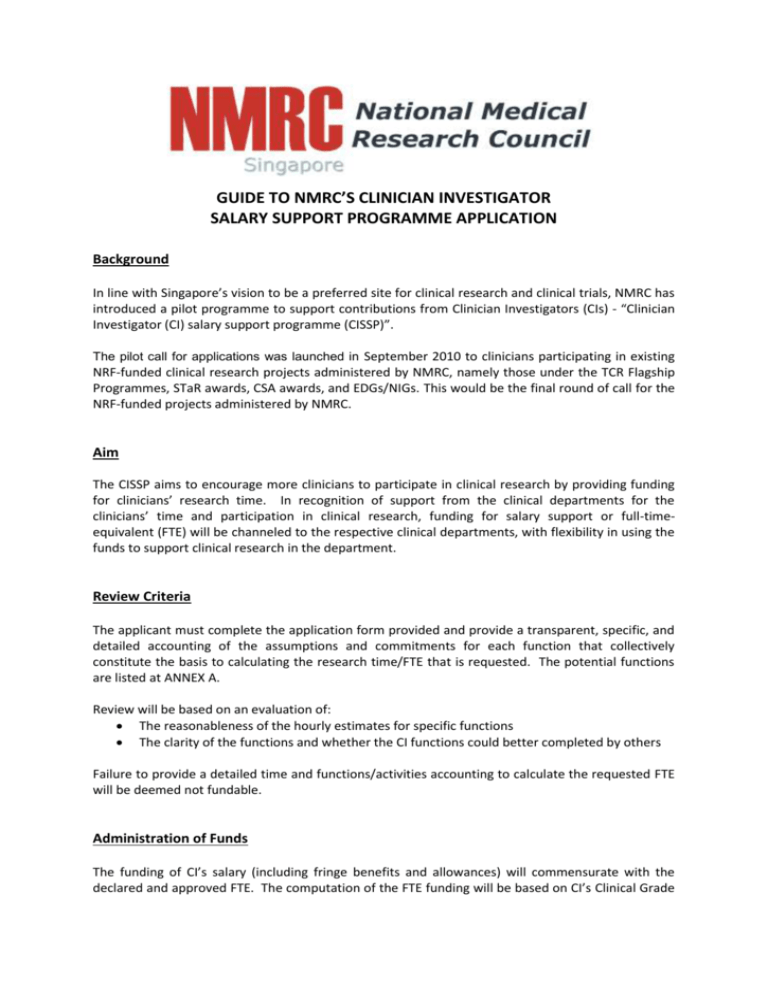
GUIDE TO NMRC’S CLINICIAN INVESTIGATOR SALARY SUPPORT PROGRAMME APPLICATION Background In line with Singapore’s vision to be a preferred site for clinical research and clinical trials, NMRC has introduced a pilot programme to support contributions from Clinician Investigators (CIs) - “Clinician Investigator (CI) salary support programme (CISSP)”. The pilot call for applications was launched in September 2010 to clinicians participating in existing NRF-funded clinical research projects administered by NMRC, namely those under the TCR Flagship Programmes, STaR awards, CSA awards, and EDGs/NIGs. This would be the final round of call for the NRF-funded projects administered by NMRC. Aim The CISSP aims to encourage more clinicians to participate in clinical research by providing funding for clinicians’ research time. In recognition of support from the clinical departments for the clinicians’ time and participation in clinical research, funding for salary support or full-timeequivalent (FTE) will be channeled to the respective clinical departments, with flexibility in using the funds to support clinical research in the department. Review Criteria The applicant must complete the application form provided and provide a transparent, specific, and detailed accounting of the assumptions and commitments for each function that collectively constitute the basis to calculating the research time/FTE that is requested. The potential functions are listed at ANNEX A. Review will be based on an evaluation of: The reasonableness of the hourly estimates for specific functions The clarity of the functions and whether the CI functions could better completed by others Failure to provide a detailed time and functions/activities accounting to calculate the requested FTE will be deemed not fundable. Administration of Funds The funding of CI’s salary (including fringe benefits and allowances) will commensurate with the declared and approved FTE. The computation of the FTE funding will be based on CI’s Clinical Grade and the respective Annual Salary Cap as follows: Table 1: NMRC Annual Salary Cap based on Clinical Grade Clinical Grade Senior Consultant Consultant Associate Consultant Registrar Medical Officer Annual Salary Cap $300,000 $200,000 $150,000 $120,000 $80,000 The Clinical Departments will be awarded consolidated funding amount for successful applicants within the department, based on approved FTE spent on research (i.e., within the grant period). Upon award, the Heads of Departments (HODs), with assistance from the Host Institutions’ Research and Development Offices (RDOs), will be required to submit the departmental plan detailing their planned use of the consolidated FTE funding to NMRC for approval. The plan should include details of the KPIs to be achieved for the support given (e.g., patients accrued). The plan has to be signed off by both the HOD and the respective RDO. RDOs must inform NMRC of any subsequent variation to the approved plan. Fundable items that could be listed in the departmental plan include: (i) “backfilling” of the CIs’ clinical duties; (ii) expertise and scientific collaboration related to the clinical research project to include biostatisticians and bioinformaticians, site-monitoring, data analysis and management, and training of CRCs1; (iii) other research-related support costs that help in the clinical research project. The items must be in accordance to NRF Fund Guide and NMRC Financial Regulation policy. The funds are not be used as direct monetary incentives to the CIs or to cover any costs relating to routine clinical care/services. For reimbursement of the CIs’ research time, HOD should submit the department’s claim form (signed off by HR, HOD, and Finance) and the CIs’ monthly payslips (verified by HR), to NMRC on a quarterly basis. Consolidated funding of the approved research time/FTE support will be reimbursed to the respective CIs’ Departments through the Institution on a quarterly basis. Funding will cease together with the grant funding of the project. Should there be any extension of the grant, funding of the research time/FTE for the extended period will not be provided in line with the current policy of no-cost extension for all grants. Audit Monitoring Institutions and Departments are required to submit an annual report on the utilization of the funds received and provide justifications for any uncommitted funds. Institutions and Departments are also requested to keep records that reflect the actual hours spent in the clinical research projects such as using timesheets. These records should be verified by the 1 The comprehensive list of expertise can be provided by SCRI at Annex B. respective CI, HODs and/or HR. NMRC may conduct sampling audits and on-site visits to gather feedback from the CIs to ensure that they have been given the support by their Departments and Institutions to carry out clinical research. Should there be any non-compliance with the policy, NMRC will inform the respective Head of Institutions (i.e., CEOs or Directors, and HODs) and future claims / applications from the Department under this programme may not be processed. ANNEX A Potential Functions of a CI in a Clinical Research Project To include details and specifics, as indicated in the sample application form Pre-experiment Development of protocol Recruitment of patients Training or management of clinical staff During experiment Laboratory work Execution of clinical procedures Patient follow-up Training or management of technical staff Database-related work Post-experiment Result analysis and write-up Manuscript drafting ANNEX B List of Expertise and Scientific Collaboration Provided by SCRI i. ii. iii. iv. v. vi. vii. viii. Project Management Data Entry Data Management Data Analysis – primary and secondary analysis Site Monitoring Design Protocol Develop Clinical Research Networks Medical Writing Note: If PIs plan to collaborate with SCRI scientists in a multi-site protocol, the protocol must be developed in collaboration with SCRI. Support for SCRI time/effort to help execute the protocol must be written into the budget. The NMRC application and a written letter of collaboration must be included in the NMRC application. SCRI is a collaborator both before and after NMRC grant submission. Pre-submission time/effort will come from SCRI grants. SCRI does not provide services. It provides expertise and scientific collaboration. Collaboration/expertise is only provided to those who work with SCRI to develop the protocols.
